|

|
|
|
|
 |
SUPERIOR FORCE
: The Conspiracy Behind the Escape of
Goeben and Breslau
© Geoffrey Miller |
|
|
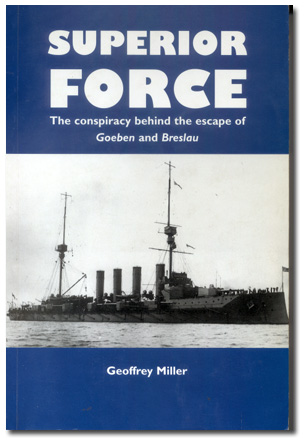 |
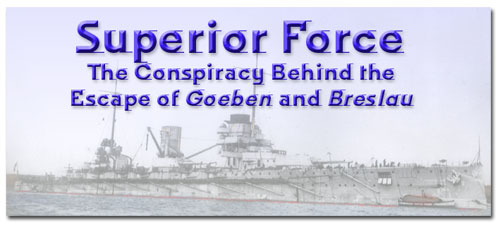
|
|
Home Page
|
|
This
site contains the entire text of
“SUPERIOR
FORCE”
|
|
|

Admiral Sir John
Arbuthnot Fisher |
Superior Force
the
conspiracy behind the escape of Goeben and
Breslau
The first volume of the Straits Trilogy
- Volume I: Superior Force : the
conspiracy behind the escape of Goeben
and Breslau
- Volume II: Straits : British Policy
towards the Ottoman Empire and the
Origins of the Dardanelles Campaign
- Volume III: The Millstone : British
Naval Policy in the Mediterranean,
1900-1914, the Commitment to France and
British Intervention in the War
These books provide a comprehensive
account of British naval and diplomatic
policy in the two decades prior to the Great
War, focusing in particular on the escape of
the German ships Goeben and Breslau
[Superior Force], the origins of the
Dardanelles Campaign [Straits], and the
political and diplomatic imperatives behind
the British decision to enter the war in
August 1914 [The Millstone].
Due to the limited number of copies of
"Superior Force" remaining in print, I have
designed this website to provide those who
may be interested with the entire text of
the book. Please note however that all
rights are reserved and that no part of this
publication may be further reproduced by any
means without the prior permission of the
author, Geoffrey Miller, who has asserted
his right in accordance with sections 77 and
78 of the Copyright, Designs and Patents
Act, 1988 to be identified as the author of
this work. |
Superior Force : the
conspiracy behind the escape of Goeben and
Breslau
SYNOPSIS
In the first weeks of August, 1914 the
German battle cruiser, Goeben, and her
accompanying light cruiser, Breslau, escaped
the clutches of the pursuing British
Mediterranean Squadron and took refuge at
Constantinople, where they would later exert
a decisive influence upon Turkey’s attempts
to remain out of the war.
In October 1914, with the connivance of the
Turkish Minister of War, but against the
wishes of the majority of the Turkish
Cabinet, the German Admiral at the head of
the Turkish Navy single-handedly forced the
issue. At the helm of Goeben, Admiral
Souchon manoeuvred into the Black Sea and
deliberately shelled Russian ships, ports
and shore installations. The Turks,
reluctant to the last, were finally
catapulted into the War. Yet, would this
outcome have eventuated without the presence
of Admiral Souchon and Goeben? The Turkish
fleet by itself was too weak to risk a
sortie in the Black Sea. Without Goeben
could the issue have been forced?
Meanwhile, the First Lord of the Admiralty,
Winston Churchill, actively sought Greek
co-operation for a planned major offensive
against the Turks at the Dardanelles. His
plea for assistance reached the British
Officer at the head of the Greek Navy,
Rear-Admiral Mark Kerr, who set impossible
conditions which he knew would result in the
proposal being rejected in London. What
Churchill did not know, and which has never
previously been revealed, was that Kerr had
not only removed any chance of Greek
participation at the Dardanelles, but had
also been instrumental in the conspiracy
afoot in Athens during August to allow the
German ships to escape in the first place.
Various accounts of the escape have sought
to apportion blame, with the Admiralty
(under Churchill), the Commander-in-Chief,
Mediterranean, and the Rear-Admiral, First
Cruiser Squadron all being found culpable to
some extent. What no previous account has
revealed however is the fact that there was
an organized conspiracy afoot in Athens,
involving the Greek Premier on one side, and
the King and a serving British Rear-Admiral
on the other, to facilitate the escape of
the German ships.
The eventual destination of Goeben and
Breslau (a mystery to the British until the
ships actually reached the Dardanelles) was
common knowledge amongst ruling circles in
Athens some hours before Britain declared
war on Germany. Privy to this secret was
Rear-Admiral Mark Kerr, the British Officer
at the head of the Greek Navy. For three
vital days Kerr kept the secret to himself;
then, when it was almost too late, he fed
the Admiralty clues which were, however, not
acted upon.
In addition to being the most complete
account of the dramatic escape yet
published, Superior Force, for the first
time, reveals the extent of the Athens
conspiracy and the ambivalent rôle played by
Mark Kerr who, soon after, would also remove
any chance of Greek co-operation in the
major offensive planned by Churchill against
the Turks at the Dardanelles. Few men can
genuinely be said to have changed history;
by his actions in Athens in the summer of
1914 Mark Kerr is one of those few. |

 |
| |
Superior Force : Table
of Contents |
|
| PART
I |
THE
ESCAPE |
|
|
Introduction
|
|
|
1 |
Mediterranean
Meanderings |
|
|
The British position in the Mediterranean—Fisher’s
preference for the battle cruiser—the Anglo-French naval talks—the
plan to evacuate the Mediterranean—a compromise is reached—the Mittelmeerdivision—Admiral
Souchon—preparations for war—Goeben
and Breslau rendezvous at
Messina—the British Mediterranean Squadron—Admiral Milne —Inflexible visits Constantinople—the slow awareness of the
gathering storm—Rear-Admiral Troubridge and the First Cruiser
Squadron—events at Durazzo. | |
|
|
|
2 |
Opening
Moves |
|
|
Milne regroups his forces—the
Admiralty ponders whether to reinforce the Mediterranean —the
“superior force” telegram—Italian neutrality likely—the
Admiralty ponders whether to denude the Mediterranean—Sailing
Orders—Troubridge’s opinion of a superior force —a
misunderstanding—Grey’s chickens come home to roost—the moral
commitment to France—the Cabinet debates—the assurance to
Cambon—Milne’s efforts to contact the French—Admiral Lapeyrère
has second thoughts. | |
|
|
|
|
3 |
The
First Shot |
|
|
Souchon makes his plans—a change of
heart in Berlin—Souchon holds to his intention— the opening
bombardment—Troubridge’s dispositions—Battenberg looks to the
west— the French set sail at last—a missed opportunity?—the
chance meeting—Churchill jumps the gun—a voluntary
supererogation—chaos in the War Room—the failure of the War Staff. | |
|
|
|
|
4 |
The
Chase Begins |
|
|
Souchon’s limited options—more
speed—the British ships are found wanting—Captain Kennedy has a
plan but is over-ruled—Milne effects a concentration—Troubridge’s
anomalous position—Captain Kennedy is sent to Bizerta—Souchon
returns to Messina— the problems of coaling—startling news from
Constantinople—the dilemma of Admiral Haus—Souchon frames his
sailing orders. | |
|
|
|
|
5 |
The
Break-out |
|
|
The German ships are
located—further misunderstandings—Troubridge’s premature
sortie—the conflicting analyses of Milne and Troubridge—a fiasco
in Bizerta—Milne’s
idée
fixe—Souchon steers east—Milne returns to Malta—the Italian
prohibition—
Gloucester
takes up the chase—Dublin
misses her chance. | |
|
|
|
|
6 |
Admiral Troubridge Changes
His Mind |
|
|
Troubridge’s dilemma—no coal for
the destroyers—his intentions known—a plan is
formulated—Troubridge holds his course initially—the decision to
engage—the puzzle of the Austrian fleet—the torment of Admiral
Troubridge—the intervention of his Flag Captain—Troubridge
abandons the attempt—Milne’s reaction. | |
|
|
|
|
7 |
The War That Was Cancelled |
|
|
Some clues as to Troubridge’s state
of mind—Gloucester continues the chase alone— contact is lost—Milne
returns to Malta—the puzzle – what are Souchon’s intentions?—
the recall of
Gloucester –
Milne is called to account—the anomalous position of Austria —the
strange case of the punctilious Admiralty clerk—confusion over
signals—an unwarranted assumption—where was Churchill?—a final
chance—intelligence is received —who is “Metriticicas”?—Milne’s
doubts—reliable information? | |
|
|
|
|
8 |
Souchon Arrives! |
|
|
Souchon rests his crews, then
coals—positive news from Constantinople—Milne flounders—what did
the Admiralty know?—Milne’s options—Goeben
and Breslau reach the Dardanelles—a dubious transaction is announced. | |
|
|
|
| PART
II | THE
GREEK CONNEXION | |
|
|
|
|
9 |
Mark Kerr and the Balkan
Background |
|
|
Mark Kerr, an untypical officer—his
association with Battenberg—unorthodox ideas—an opportunity
presents itself—friends in high places—Kerr appointed C-in-C of
the Greek Navy—Kerr and the King—the influence of Germany—an
unusual request—Kerr’s advice ignored—the Greek naval
build-up—Balkan tensions—the formation of the Balkan League—the
Balkan Wars—Greece victorious at sea—Wilhelm plays a lone hand—
Greece and Turkey take matters into their own hands. | |
|
|
|
|
10 |
The Battleship
Summer |
|
|
The Aegean naval race—the Turks buy
a dreadnought—Greece desperately seeks ships— conflict between
Greece and Turkey appears inevitable—Minister and Ambassador come
home on leave—a poor deal in America—fears that war would result
in the closure of the Straits—Venizelos’ bluff—stalling for
time—a meeting with the Turks—the greater conflict intervenes—Venizelos
discovers a let-out—Germany woos and wins Turkey. | |
|
|
|
|
11 |
The Nocturnal Aberration of
Eleutherios Venizelos |
|
|
Constantine plumps for
neutrality—Wilhelm’s furious reaction—the German threat—the
destination of the German ships revealed—Kerr’s knowledge of
this—a circuitous route— the mystery of Syra—Venizelos is less
than forthright—coal for Souchon—Venizelos seeks retrospective
approval—his motives. | |
|
|
|
|
12 |
The Case Against Kerr |
|
|
The atmosphere in Athens—Compton
Mackenzie and the campaign of disinformation— how much did Kerr
know?—was Kerr deliberately planted?—his association with the
Kaiser—did the plan backfire?—the perils of informal
networks—Kerr tries to be too clever—his post-war reticence. | |
|
|
|
|
13 |
The Sweeping Offer |
|
|
Venizelos’ confederation
scheme—an enthusiastic response—Venizelos wants more—an approach
to Russia—a difference of opinion in the Foreign Office—the
problem of Bulgaria—Sazonov more concerned about Turkey—this
concern mirrored in London— the clash between Venizelos and his
Foreign Minister—a sweeping offer—a disappointing reply—Venizelos
plays for time—the talks with Turkey reconvened—Talaat’s
ulterior motive—a bribe to Bulgaria?—the return of Sir Francis
Elliot—Sazonov takes the bait— the question of action against
Turkey—the report of the Military Attaché—Churchill
intervenes—the prospect of Greek co-operation. | |
|
|
|
|
14 |
A Question of Semantics |
|
|
The irreconcilable problem—Kerr
formulates his plan—Russian intransigence—the Entente fully
committed—the King and Venizelos—a difference in emphasis—Streit
intervenes—Kerr is carried away—Venizelos’ reaction—the threat
of resignation—Kerr’s discouraging telegram—the prospect of
Greek participation founders—the threat from Bulgaria—the
aftermath—Kerr’s position—the difficulty of placing him—a
fortuitous opportunity arises—conclusion. | |
|
|
|
| PART
III | THE
AFTERMATH | |
|
|
|
|
15 |
‘Letting the Goeben
Escape’ |
|
|
The effect of
Goeben’s
presence—the options available to the Turks—the extent of
Enver’s and Souchon’s accountability—the search for a
scapegoat—Churchill’s initial responsibility—the cause of his
enmity—a mitigating factor—Mallet’s undiplomatic assertion—an
alternative theory—Grey and the fate of Constantinople—fear of
Russian incursion into Persia—the march of military operations—the
Indian Expeditionary Force—the War Council meets—action against
Turkey—the Foreign Office exonerated. | |
|
|
|
|
16 |
The Terrible ‘Ifs’ |
|
|
Churchill’s invocation of a higher
authority—Churchill’s “if’s” considered—other “if’s”
to be considered—the battle cruiser concept—French inaction—the
problem of coal— Souchon and the Adriatic—Milne’s
pre-conceptions—faulty staff work—Churchill’s early moves—the
board changes—Battenberg’s unfortunate war—the Greek
responsibility —the actions and omissions of Venizelos, Constantine
and Kerr—a chain of events—fate or the work of man? | |
|
|
|
|
17 |
Court Martial |
|
|
Milne’s recall—Troubridge and
Milne lay the groundwork for their defence—Milne’s frosty
reception—questions to answer—a friend at Court—official
approbation—a scapegoat is found—the awkward report of Captain
Howard Kelly—a Court of Inquiry —its finding—the charge as
framed—pressure on the Prosecutor—the Court Martial—the
verdict—the Prosecutor’s personal opinion—Admiralty reactions. | |
|
|
|
|
18 |
Epitaph
|
|
|
Admiral Hamilton’s unguarded
comment—what was discussed at the Admiralty?— Troubridge’s
astounding allegation—the mystery of Captain Vere—a possible
answer— Troubridge’s personality—a tenuous interpretation—who
was to have the battle cruisers? —Troubridge’s dubious
recall—the convenient timing of an important signal—the
abandonment of Fawcet Wray—Mallet’s defence. | |
|
|
|
|
19 |
The Last Sortie |
|
|
The dire military position—Enver is
less assured—the Aegean Squadron—various contingencies—a moral
raising demonstration—should the British have known?—Admiral
Hayes-Sadler’s unfortunate decision—the separation of the British
forces—Rebeur-Paschwitz frames his orders—dubious
intelligence—the raid against Imbros on 20 January 1918—surprise
is achieved—the damage inflicted—the aerial attacks—the
minefield— Rebeur-Paschwitz’s blunder—Breslau is lost—Goeben
marooned—further aerial attacks —a want of initiative—the
efforts to refloat the battle cruiser—Goeben
escapes again— aerial reconnaissance—the
aftermath—Hayes-Sadler’s contentious apologia—analysis of the
aerial operations—another reputation ruined—the end for Enver,
Djemal and Talaat. | |
|
|
|
|
APPENDICES
|
|
| i. | The part played by the Opposition in
the decision for war. | |
| ii. | Identity
of alleged British collier from which Goeben
coaled, Messina, 4-5 August. | |
| iii. | The Lost Day — Information received
and processed in London on Sunday 9 August 1914. | |
| iv. | The Blücher
Mystery | |
| v. | Extracts from the Courts-Martial
convened to investigate the sinkings of Raglan
and M28. | |
| vi. | The reason for the absence of Invincible
from the Mediterranean, 1914. | |
| vii. | Mediterranean
War Orders. | |
| viii. | Pre-war Activities of British Naval
Intelligence. | |
|
|
|
|
BIBLIOGRAPHY
|
|
|
INDEX
|
|
|
Please note that, in addition to this
site, each book has its own, dedicated,
web-site.
At all of these sites, the full text is
available on-line:
www.superiorforce.co.uk
[Superior Force complete text]
www.dardanelles.co.uk [Straits
complete text]
www.the-millstone.co.uk [The
Millstone complete text]
TO GO TO
ANY OF THESE DEDICATED WEB SITES,
PLEASE
SELECT A BOOK COVER BELOW.
|
 |
Superior Force
The Conspiracy Behind the Escape of Goeben
and Breslau
xxiii + 458 pages, 20 illustrations, 2 maps
Full bibliography, notes and index
Card cover, 6¼" x 9¼"
ISBN 0 85958 635 9
Published 1996
|
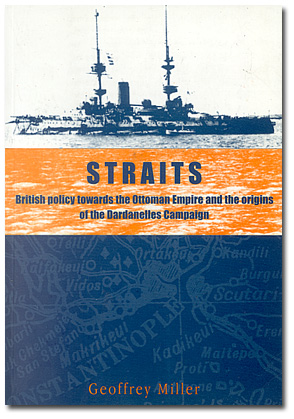 |
Straits
British Policy Towards the Ottoman Empire
and the Origins of the Dardanelles Campaign
xxvi + 604 pages, 12 illustrations, 1 map
Full bibliography, notes and index
Card cover, 5¾" x 8¼"
ISBN 0 85958 635 9
Hardcover ISBN 0 85958 663 4 [out of print]
Published 1997
For an overview of "Straits" (remaining within this web-site), please
click:

To go to the dedicated web-site for
"Straits", please click:

The full text is available on-line at
www.dardanelles.co.uk
Please note that
Straits is now out-of-print; however,
a digital version is available. |
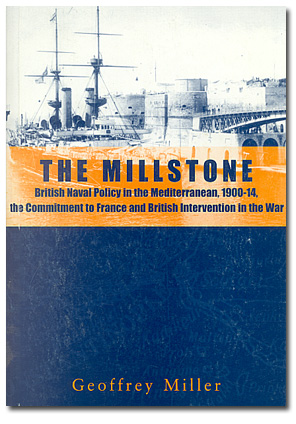 |
The Millstone
British Policy in the Mediterranean,
1900-1914, the Commitment to Franceand
British Intervention in the War
xv + 611 pages
Full bibliography, notes and index
Laminated card cover, 5¾" x 8¼"
ISBN 0 85958 690 1
Published 1999
For an overview of The Millstone
(remaining within this web-site), please
click:

To go to the dedicated web-site for "The
Millstone", please click:

The full text is available on-line at
www.the-millstone.co.uk
Please note that
The Millstone is now out-of-print;
however, a digital version is available. |
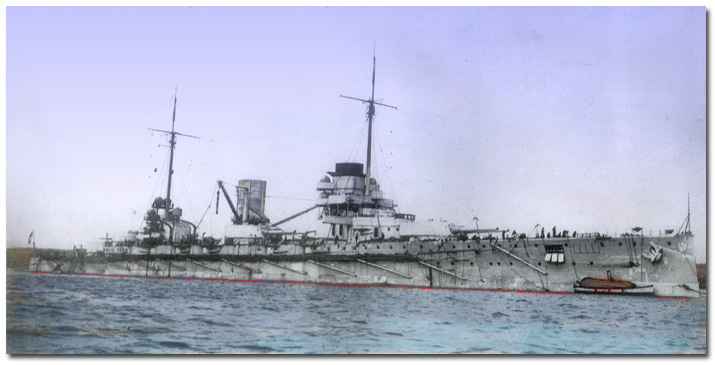
SMS Goeben
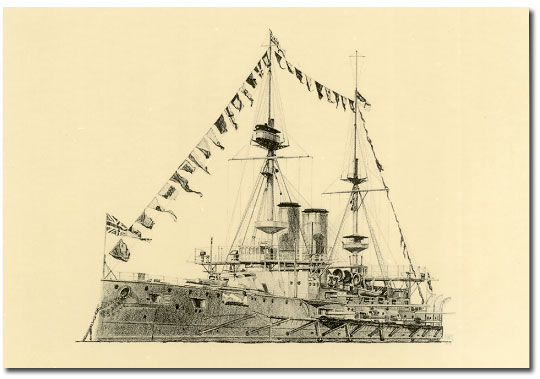 |
Ships of the Victorian & Edwardian Navy :
I have been drawing the ships of the
Victorian and Edwardian Navy for twenty
years for my personal pleasure and I am
including some of these drawings on this
site in the hope that others may find them
of interest.
The original drawings are all in pencil.
Reducing the file size and therefore the
download time has resulted in some loss of
detail.
A set of postcards
featuring eight of my drawings is now
available for £2.50, which includes postage
anywhere in the world.
For more
information please click on the drawing
below:
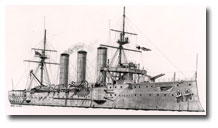
|
 |
The Links Page :
As the range of our activities
is so diverse, we have a number of different
websites. The site you are currently viewing is
wholly devoted to the first of the three
non-fiction books written by Geoffrey Miller,
and deals specifically with the escape of the
German ships
Goeben and Breslau to the
Dardanelles in August 1914. The main Flamborough
Manor site focuses primarily on accommodation
but has brief details of all our other
activities. To allow for more information to be
presented on these other activities, there are
other self-contained web-sites. All our
web-sites have a
LINKS
page in common, which allows for easy navigation
between the various sites. To find out where you
are, or to return to the main site, simply go to
the
LINKS
page.
|
 |
|

|
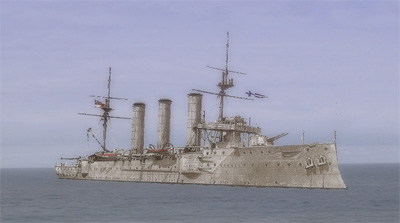
HMS Berwick
[Original artwork © 2004 Geoffrey
Miller] |
|
Geoffrey Miller
can be contacted by:
-
Telephone
- 01262 850943 [International:
+44 1262 850943]
-
Postal address
-
The Manor House,
Flamborough,
Bridlington,
East Riding of Yorkshire, YO15 1PD
United Kingdom.
-
E-mail
-
gm@resurgambooks.co.uk
|
|
|

|
|
|
|
|
|
|